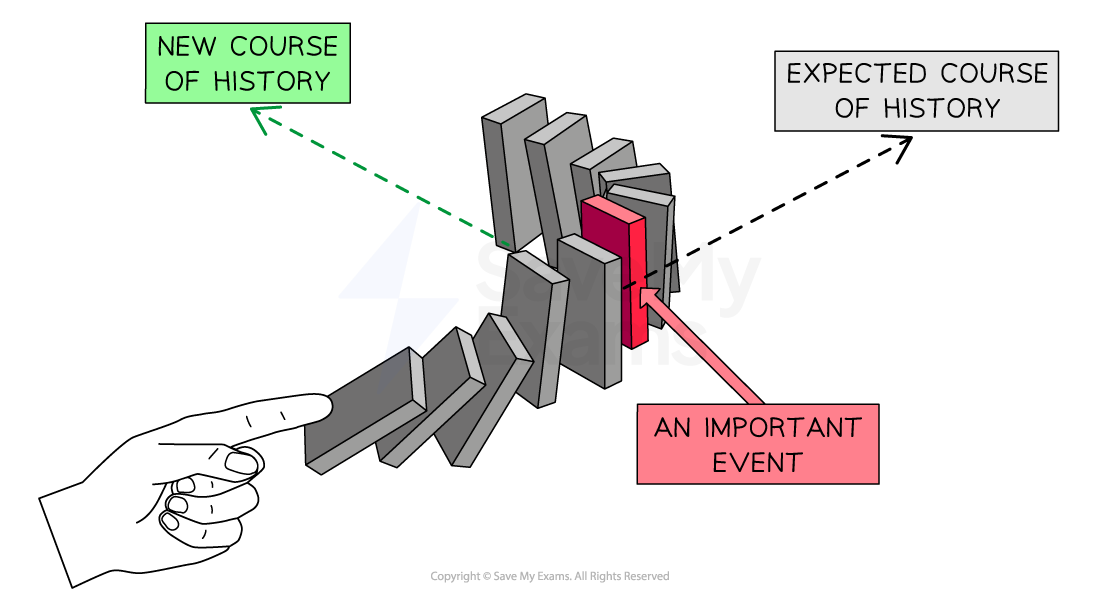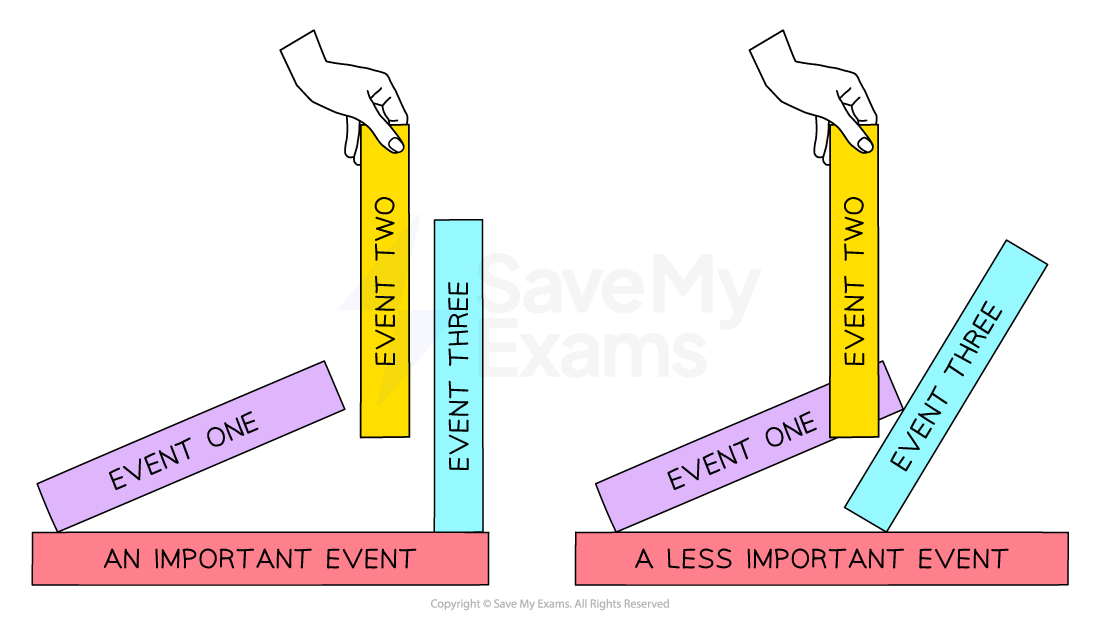The 16 Mark "Explain the Importance of " Question (Edexcel GCSE History): Revision Note
Exam code: 1HI0
Summary of Question 3
Question 3 requires you to explain why a particular event was important for a key theme, such as Cold War tensions
You’ll be given three options
You must answer two
Each option is worth 8 marks
This question will require you to use second-order concepts in your answer
Amount of marks | 16 (2 x 8 marks) |
|---|---|
The time that you should spend on the question | No more than 25 minutes |
An example of the type of question you may encounter can be seen below:

In previous years, this question has focused on the following topics in Superpower Relations:
Year of Exam | Question Topic |
|---|---|
2018 (opens in a new tab) | Option one: The USA's development of the atomic bomb for relations between the Superpowers in the years 1945-49 Option two: The Bay of Pigs incident for relations between the USA and the Soviet Union Option three: The Brezhnev Doctrine for the Soviet Union's control of Czechoslovakia |
2019 (opens in a new tab) | Option one: The Potsdam Conference for early Cold War tension Option two: The refugee problem in Berlin for increasing tensions between East and West in the years 1958-61 Option three: The 'Second Cold War' for relations between the Superpowers |
2020 (opens in a new tab) | Option one: NATO (1949) for the development of the Cold War Option two: The summit meetings of 1959-61 for relations between East and West Option three: The Soviet invasion of Afghanistan (1979) for Superpower relations |
2021 (opens in a new tab) | Option one: The Berlin Crisis (1948-49) for the development of the Cold War Option two: The Prague Spring for relations between East and West Option three: Détente for relations between the Superpowers in the 1970s |
2022 (opens in a new tab) | Option one: The Marshall Plan (1947) for relations between East and West Option two: The arms race in the years 1949-58 for the development of the Cold War Option three: The Carter Doctrine (1980) for relations between the USA and the USSR |
2023 (opens in a new tab) | Option one: The formation of the Warsaw Pact (1955) for Superpower relations Option two: Soviet relations with Cuba for tension between East and West in the 1960s Option three: The USA’s Strategic Defence Initiative (SDI) for US-Soviet relations |
2024 | Option one: The Yalta Conference for relations between East and West Option two: Khrushchev’s Berlin ultimatum for tension between East and West Option three: SALT 1 for relations between the USA and the Soviet Union in the 1970s |
How to explain importance
Importance is a key second-order concept in history
Second-order concepts allow you to:
Understand history
Have a complex explanation
Historical importance is often subjective
Each historian brings their own opinion on what events or people are important
Importance is decided using hindsight. An event is considered important if it:
Created new ideas
Directly changed events at the time
Affected large groups of people
Impacted key themes of the time period, such as:
Cold War tensions
US-Soviet relations
Had important long-term impacts that can be seen today
To understand importance, visualise a set of falling dominoes
An important event, development or person changes the direction of all of the dominoes that come after it

Imagine the set of dominoes again
An important development, event or person, when taken out of the sequence, stops other dominoes from falling
If it is less important, it does not stop the dominoes from falling

How to answer an "Explain the importance of" question
You must only select two of the three options
If you only answer one of the questions, you will only be able to achieve a maximum of 8 marks
Choose the two options where you can:
Recall accurate, specific knowledge
Explain why that event mattered for the theme
Give two developed points per answer
The theme in the question will usually be either:
Cold War tensions
Did the event increase or reduce hostility between East and West?
US-Soviet relations
Did the event improve or worsen their relationship?
If you do not explain the importance of the event to the key theme in the question, you will be limited to 2 marks for each option that you answer
"Explain the importance of" question structure
Your answer should include:
Specific relevant knowledge
Complex explanations showing:
How the event impacted the key theme in the question
How important the event was in the development of the Cold War
Your answers could be written in PEE paragraphs:
P — Make a point about the question
E — Include evidence to support the point you have made (K)
Focus on the event mentioned in the question
E — Explain the question (SOC)
Focus on the key theme of the questions
Include a complex explanation showing your understanding of the importance
To achieve full marks for one option, you should aim to write two paragraphs
4 marks for each question are awarded for knowledge (K)
4 marks for each question are awarded for your analysis of second-order concepts consequences and significance (SOC)
Be sure to:
Put a cross in the box next to your chosen option
Answer in the correct space on the paper
Only answer two options
You will not have time to answer all three options, and you will not get any extra marks for doing so

Worked example of an "Explain the importance of" question
Worked Example
Explain two of the following:
The importance of the Yalta Conference (February 1945) for relations between East and West. (8)
The importance of the Soviet takeover of Eastern Europe for the development of the Cold War. (8)
The importance of SALT 2 for relations between the USA and the Soviet Union in the 1970s. (8)
(Total for Question 3 = 16 marks)
Answer
Indicate your FIRST choice on this page.
Indicate which question you are answering by marking a cross in the box. If you change your mind, put a line through the box and then indicate your new question with a cross.

The Soviet takeover of Eastern Europe was important for the development of the Cold War because it showed the spread of communism across Europe (SOC). Stalin wanted to keep control of the countries that the Red Army had liberated during the Second Cold War. He wanted these countries in Eastern Europe to act as a ‘buffer zone’ between the East and West. However, Stalin's methods to create the satellite states were seen as aggressive. For example, during the 1947 elections in Poland, a campaign of violence and intimidation led to the creation of a fully communist government (K). This led to the development of the Cold War because Truman saw the creation of satellite states as a deliberate attempt to spread communism (SOC). The lack of free elections also broke the agreement made at the Yalta Conference (1945). This made the USA feel that they had to increase their involvement in Europe to stop the spread of communism. This resulted in the Truman Doctrine (1947) and the Marshall Plan (1948).
Another reason why the Soviet takeover of Eastern Europe was important for developing the Cold War was that it worsened US-Soviet relations (SOC). From 1940 to 1948. the Soviet Union has created an 'Eastern Bloc' of communist countries from East Germany to Bulgaria. This had formed a political divide across Europe (K). This developed the Cold War because it looked to the USA as the Soviet Union had created an armed border between the Soviet Union and the West. This inspired Churchill's 'Iron Curtain' speech in 1946. This called the Soviet Union a threat to freedom and peace. The speech led to even greater tensions between the USA and the Soviet Union, leading to a build-up of military forces by both sides (SOC).
Indicate your SECOND choice on this page.
Indicate which question you are answering by marking a cross in the box. If you change your mind, put a line through the box and then indicate your new question with a cross.

SALT 2 was important for US-Soviet relations in the 1970s because it eased the arms race between the two countries (SOC). In 1974, negotiations began for SALT 2, to build upon the success of SALT 1. The treaty was not completed until 1979. SALT 2 agreed to ban the further development of new nuclear technology such as MIRVs and to have equal limits for strategic bombers and missile launchers (K). This helped to improve US-Soviet relations because it showed a continued commitment by both sides to limit their nuclear technology (SOC). This reduced the military threat posed by the USA and the Soviet Union, leading to more opportunities to pursue a better diplomatic relationship. Therefore, SALT 2 continued the progress in the limitation of nuclear weapons between the USA and the Soviet Union.
However, it could be argued that SALT 2 had a limited impact on US-Soviet relations because of other world issues (SOC). By 1979, US-Soviet relations had worsened. Democrats and Republicans did not want to pass SALT 2. The US politicians believed SALT 2 gave the Soviet Union too much power. In addition, the actions of the Soviet Union became more aggressive. In December 1979, the Soviet Union invaded Afghanistan (K). This meant that SALT 2 never received ratification from the US Senate. As a result, the treaty was never upheld by either the USA or the Soviet Union. This means that it had limited importance on their relations. The progress made in their relationship during the period of détente had been destroyed before SALT 2 could make a difference. Therefore, if the USA and the Soviet Union had agreed on SALT 2 earlier, it would have had a bigger impact on their relationship (SOC).

Unlock more, it's free!
Was this revision note helpful?
